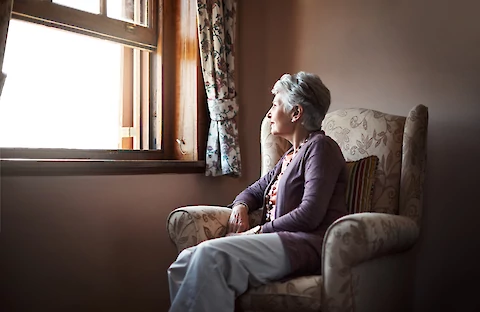
Seasonal Affective Disorder (SAD) can be a challenging experience for many seniors, and it's important to know how to manage its symptoms effectively during the spring season. As the days grow longer and warmer, learning to adapt to new routines and environments is crucial for maintaining your overall health and well-being.
In this blog post from Senior Helpers Jersey Shore, we'll be sharing a helpful guide on seasonal affective disorder for seniors encountering SAD for the first time or those who notice their symptoms extending into the spring.
Understanding the Symptoms of SAD
Seasonal Affective Disorder is a type of depression that follows a seasonal pattern, typically affecting people during the fall and winter months. Common symptoms include fatigue, difficulty concentrating, irritability, changes in appetite, and feelings of sadness or hopelessness.
For seniors, age-related factors such as reduced mobility, changes in sleep patterns, and increased isolation can exacerbate the symptoms. In spring, watch for lingering symptoms indicating SAD still affects you or a loved one.
Rearranging Schedule to Align with New Morning and Evening Routines
Establishing regular routines is essential for seniors in maintaining a sense of structure and stability. As the days get longer with the arrival of daylight saving time, adjusting to the new morning and evening schedules can be challenging.
To adapt, consider gradually shifting your bedtime and wake time to match the new daylight hours. Plan activities and meals around these times to create a consistent routine that supports your overall well-being.
Reducing Exposure to Potential Allergens
Springtime increases pollen and allergen levels that can impact seniors, especially those with allergies or respiratory conditions. To minimize exposure, keep windows closed during high pollen count days and invest in an air purifier to remove allergens from indoor air. Regularly cleaning your home, including floors and surfaces, can also help reduce allergen build-up. If you suspect allergies are causing symptoms, consult a doctor about appropriate medication or treatments.
Creating a Consistent Sleep Schedule
Adequate sleep is vital for overall health, and maintaining a consistent sleep schedule can help alleviate some symptoms of seasonal affective disorder for seniors. Aim to go to bed and wake up at the same time every day, even on weekends, to maintain your body's natural sleep rhythm.
Also, consider implementing a relaxing bedtime routine. Incorporate calming activities such as reading or listening to soft music. Limiting screen time before bed can also help promote restful sleep. If you continue to experience sleep issues, consult a healthcare professional for guidance.
Additional Tips for Managing SAD in Spring
Beyond the above suggestions, several additional strategies can help seniors manage SAD during the spring:
- Engage in regular physical activity: Exercise can improve mood and overall well-being. Aim for at least 30 minutes of physical activity most days of the week, such as walking or participating in a gentle exercise class. Make sure to consult your doctor before starting any new exercise routine!
- Spend time outdoors and get natural sunlight: Exposure to sunlight can help boost serotonin levels and improve mood. Try to spend time outside, even if it's just enjoying a cup of coffee on your porch.
- Connect with friends and family for support: Social connection is essential for mental health. Get in touch with loved ones for company or support, or consider joining a local senior group to make new connections.
- Seek professional help if needed: If your SAD symptoms persist or worsen, don't hesitate to reach out to a mental health professional for guidance and support.
Senior Helpers Provides Emotional and Physical Support
Managing seasonal affective disorder for seniors during the spring is crucial to maintain their overall health and well-being. By implementing the tips provided in this guide, you can take an active role in addressing SAD symptoms and embracing the renewal that spring brings.
If you live in Vineland, Atlantic City, Absecon, Egg Harbor Township, Bridgeton, Millville, or Mays Landing, contact Senior Helpers Jersey Shore for support and assistance in managing SAD and other senior care needs.